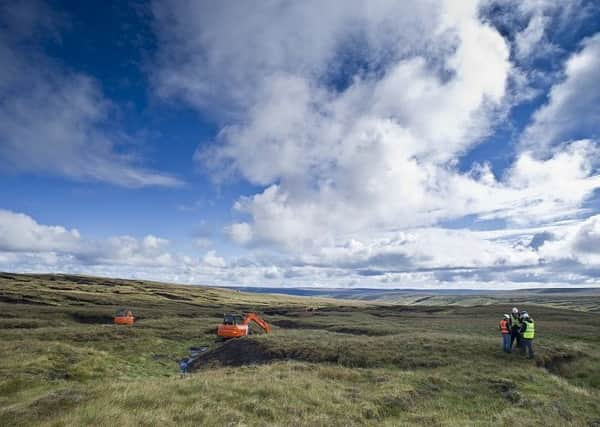Big cash injection for Yorkshire peatland restoration


Peatlands have a vital role to play. Bog mosses called sphagnum help peat to suck carbon out of the air - much like trees capture carbon compounds.
This action locks those emissions into blanket bog moors, but too many of our precious peatlands across northern England have been degraded by decades of industrial pollution and wildfires, according to conservationists.
Advertisement
Hide AdAdvertisement
Hide AdWhen the peat is made bare by acid rain and wildfires, the carbon-sucking mosses are killed off, leaving the locked-in carbon to emit back into the atmosphere.
Conservation work to reverse the declining condition of peatlands has been going on in Yorkshire for some time but the work received a fresh boost this week thanks to a new £4.45m government investment.
The North of England peat partnership, led by Yorkshire Wildlife Trust, will use the funding to restore 394ha of lowland raised bog and 1,679ha of blanket bog across 21 peatland sites.
Dr Tim Thom, the Trust’s peat programme manager, said: “It’s fantastic to see peatlands on the Government’s agenda and getting the recognition they deserve, both in terms of the benefits they bring and the parlous condition we have let so many of them reach.
Advertisement
Hide AdAdvertisement
Hide Ad“This funding will enable us to restore some of the most important and beautiful sites across the north of England. From England’s largest lowland raised bog in South Yorkshire all the way up to Northumberland’s highest point near the Scottish border, over 2,000ha of peatland will be repaired, locking up carbon, filtering our drinking water, managing flooding and providing habitat for some fascinating species.”
Defra is splitting a total of £10m between four projects across the country, including Moor Carbon, a scheme led by the Peak District National Park Authority.
The park will be working within its boundaries, on the West Pennine Moors Special Site of Scientific Interest and on Rossendale Gap to restore more than 2,100ha of blanket bog, which should help to reduce over 4,500 tonnes of carbon dioxide loss into the atmosphere every year.
Environment Minister Thérèse Coffey said: “Peatlands are an iconic aspect of the English landscape which are not only a haven for wildlife but also provide us with clean water and help reduce greenhouse gas emissions.”